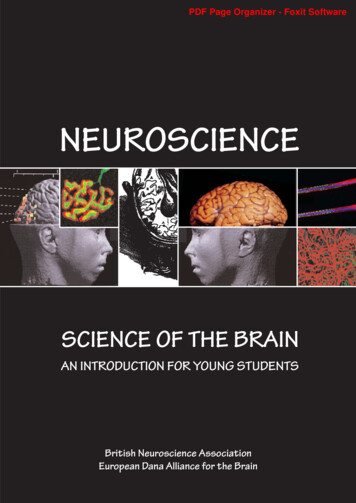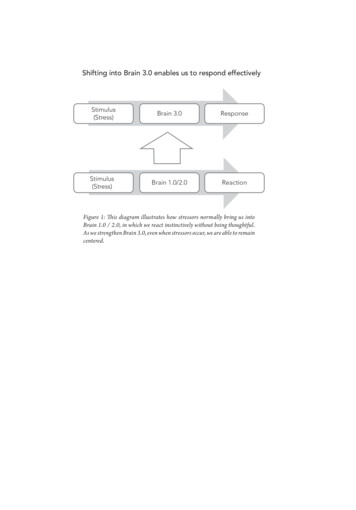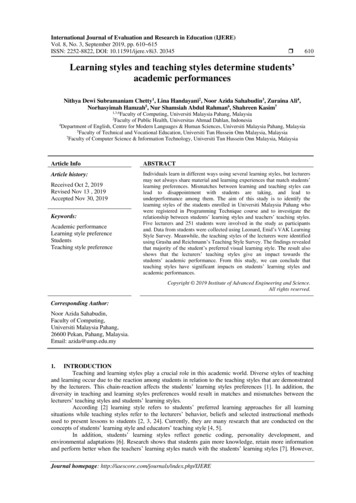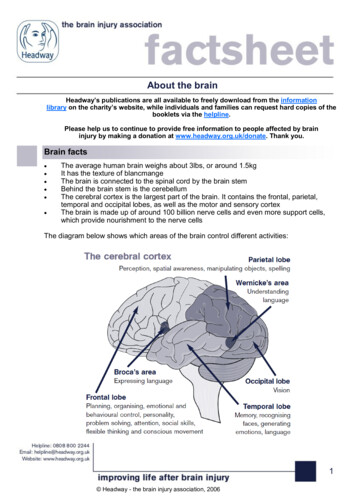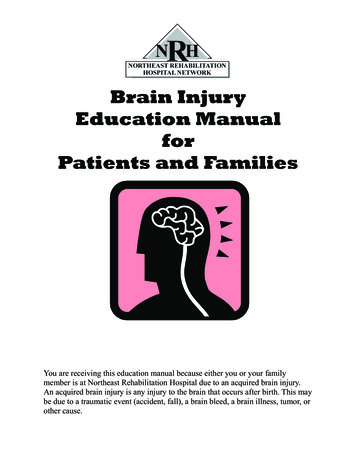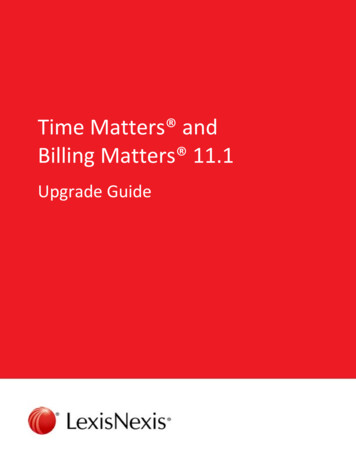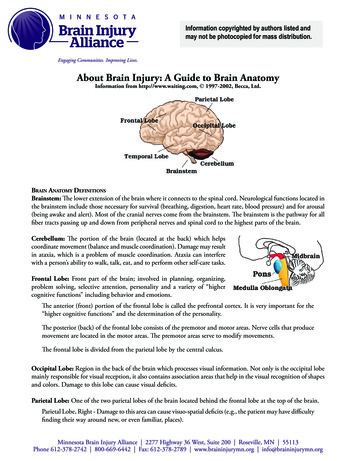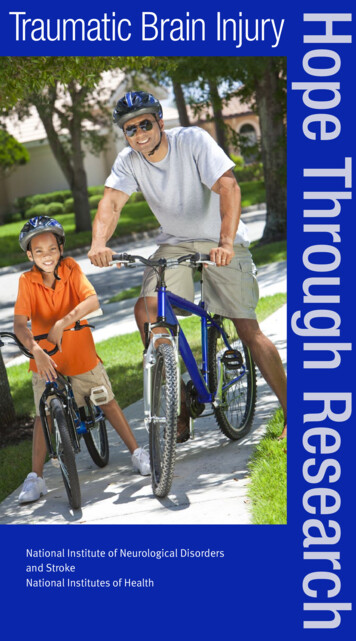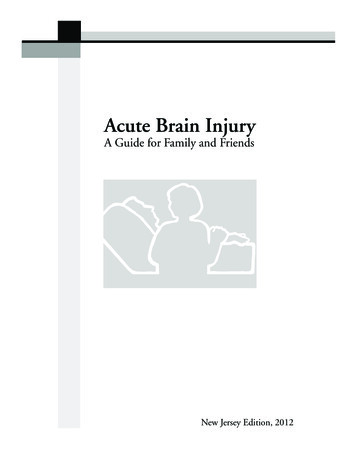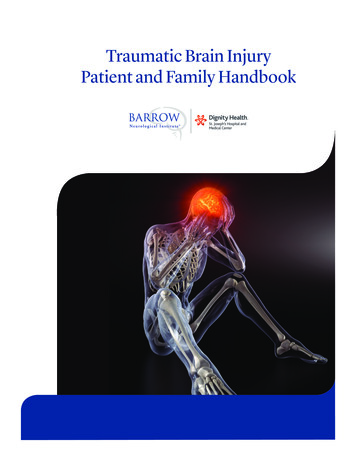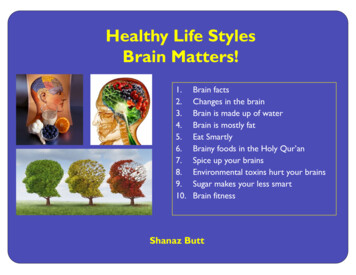
Transcription
Healthy Life StylesBrain Matters!1.2.3.4.5.6.7.8.9.10.Brain factsChanges in the brainBrain is made up of waterBrain is mostly fatEat SmartlyBrainy foods in the Holy Qur’anSpice up your brainsEnvironmental toxins hurt your brainsSugar makes your less smartBrain fitnessShanaz Butt
Brain Factsv Brain is the central controller of thoughts, movements, memories & decisions.v Brain is the same size at birth as in adulthood, and contains most of the cellsrequired through out life span.v Adult brain weighs 3 pounds (1.5 kg). It is protected by the skull (cranium),and made up of 22 bones fused together. 75% of brain mass is water.v Makes up 2% of the body's weight; yet uses 20% of body’s energy.v Uses 20% of the blood circulating and 20% of total oxygen in body.vvvvvvAwake brain produces enough electricity (25 watts) to power a light bulb.Lack of O2 in the brain for 5-10 min can damage brain permanently.There are no pain receptors in your brain, so your brain does not feel pain.There are 100,000 miles of blood vessels in your brain.2/3 of brain is made up of specialized fats.One of the most common fatty acids is oleic acid, which is also the mostabundant fatty acid in human milk and in our anbody/brain.html; org; the-human-brain/3/
Brain AnatomyFrontal Cortex (Thinking brain)§ Larger portion of the brain§ Located behind the forehead§ Executive functions;§ Controls judgement and impulse§ Damage àlapses in judgement,memory loss, disorganized thinking,short attention span, impaired learningLimbic Regions (Moody brain)§ Emotions§ AddictionBrain Stem (Reptile brain)§ Repetitive, automatic, unconscious control§ Sympathetic & Parasympathetic§ Fight or flight responses
Brain Building Blocks The brain contains 100 billion neurons (nerve cells) that send and receiveinformation around the body. Amounts to 15 X the total humanpopulation on earth. Nerves are made up cell body, axons and dendrites Axons carry information away and dendrites carry towards
Age Related Changes in the BrainNormal loss of cells beginin 4-5th decade of life( 5% neurons lost perdecade)Alzheimer’s DiseaseFemale with ADShanaz Tejani et al., 1992ControlShanaz Tejani et al., 1993
As we Get Older v Female brain more prone to anxiety attacks and depressionà menopause often afactor.v Hormone levelsàLow Estrogen resulting from menopause à linked to memory loss and“brain fog” à need natural sources of EàLow Thyroid hormone à fatigue, weight gain, lack of temperature controlà require a diet rich in Vitamin B,Vitamin A and Iodinev CirculationàHigh blood pressure, Cholesterol, Triglycerides à sluggish circulation àreduced blood flow and O2 to brain à need Exercise, Dietv Weightà Body Mass Index (BMI) à over 25 overweight.à BMI ( Weight in Pounds / ( Height in inches x Height in inches ) ) x 703à Obese people have 8 % less brain tissueà According to Prophet Mohammed (saw) we are advised to leave one thirdof our stomach empty after finishing the meal.
Then which of the favors of yourLord will you twain deny?[Quran 55:14]
Your Brain is made up of Waterv Brain is 70 % water. So water your brain!v Dehydration has severe effects on thevvvvvvvbody, especially the brainv 8 Glasses (64 oz) of water per dayMilkBeet juiceBerriesCarrot juicePomegranateCoconut water-Causes rapid hydration.Each serving contains more K than abanana, plus other essential minerals andvitamins such as iron and manganese.Also contains Na, Mg, Ca, and PTea – energy booster - Catechins keepmind sharp
Your Brain is made up of Fatsv The brain is the fattest organ in body, made up of at least 60 % fat.v The common fat is oleic acid, an unsaturated fat, found in nuts, olive oil,sunflower seeds and avocados.v Myelin, the protective sheath that covers neurons, is composed of 30%protein and 70% fat (oleic acid).v Brain cells need 2 kinds of “essential” fatty acids (Omega-3 and Omega-6)We get these fatty acids from the foods we d-fats?page 2
Omega-3 and Omega-6 Fatty Acidsv Foods rich in omega-3 include flax seeds, chia seeds, walnuts, sea vegetables,green leafy vegetables, and cold water fish like salmon, sardines, mackerel,and trout.v Omega-3 helps brain function by coating neurons (with good fat) that becomestiff with age and diet (high content of cholesterol and saturated fat in the body).v Omega-3s provide more oxygen to the brainv Omega -3 fatty acids are antidepressants, anti-inflammatory, antioxidants, andanticoagulant.v Foods rich in omega-6 include cold-pressed sunflower, safflower, corn, andsesame oils.v Support brain function, bone health, reproductive health, hair growth andregulation of metabolism.v Omega-6 is pro-inflammatory
Eat Smartv Nuts & Seeds - Peanuts, hazelnuts, cashews, almonds, walnuts, pecans, pumpkinseeds, sunflower seeds, and any other type of nut or seed are good for your brain.v Contain Omega-3 and Omega-6 fatty acids, as well as folate, vitamin E, andvitamin B6, which allow you to think more clearly.v Some seeds and nuts have thiamine, selenium and magnesium; good for memory,cognitive function and brain nourishment.v Seeds contain zincà good for memory and immune systemv Fish - Fortify the synapses and memoryv Contain Omega-3. Best fish for brain health are salmon, tuna, and herring.v Eggsv The brain shrinks with age (called brain atrophy).v Eggs are full of vitamin B12, lecithin and essential fatty acids.v The yolk, though high in cholesterol, is also high in choline, which is an importantbuilding block of brain cells and can improve memory.v Vitamin B12 helps to fight against brain shrinkage, which is often seen inAlzheimer’s disease.v Eating too many eggs can be bad for your health, eating 1-2 egg products a daycan be good for overall brain health.
Eat Smartv Green leafy Vegetables such as Kale, Spinach, Cabbage, Broccoli are full ofvitamin B6, B12, K and folate, needed by the brain to break down homocysteinelevels, which can lead to forgetfulness and Alzheimer’s disease.v Helps make red blood cells, provides nutrition to neuronsv Eggsv The brain shrinks with age (called brain atrophy).v Eggs are full of vitamin B12, lecithin and essential fatty acids.v The yolk, though high in cholesterol, is also high in choline, which is animportant building block of brain cells.v Choline can help improve your memory.v Vitamin B12 helps to fight against brain shrinkage, which is often seen inAlzheimer’s disease.v Eating too many eggs can be bad for your health, eating 1-2 egg products a daycan be good for overall brain health.
Eat Smartv Berries - improve or delay short term memory lossv Blackberries, blueberries, raspberries, etc., are full of antioxidants.v Berries are referred to as “super-fruits” because they contain fisetin andflavonoid, good for improving your memory and allowing you to recall pastevents.v Whole grains & whole grain productsv Whole wheat bran, and wheat germ have high contents of folate, as do brownrice, oatmeal, whole-grain breads, barley, and others.v Whole grain foods contain a lot of vitamin B6. Work to increase blood flow tothe brain which means a higher quality and quantity of brain function.v Avocados - monounsaturated fats improve vascular health and blood flow.v Avocados are smooth and creamy because of their fat content. They are rich in afatty acid called oleic acid, which helps to build the coating of insulation, knownas myelin (found in white matter of the brain.) Myelin helps information travel atspeeds of up to 200 miles per hour.v Neurons without myelin (gray matter) process information at slower speeds.v Tomatoes - lycopene, a powerful antioxidant. Could protect against freeradical damage to brain cells
Eat Smartv Dark Chocolate contains antioxidants and natural stimulants (includingcaffeine), which improve focus and concentration, and stimulate productionof endorphins, which improves mood. Also increases levels of serotonin,acting as an antidepressant.v Dark chocolate is rich in fiber and a rich source of magnesium, which canhelp balance brain chemistry.v Apples and Plums contain a special antioxidant called quercetin, whichprotects your brain cells from damage. Degradation can lead to a decline incognition which includes oxidative injury. Thus, apples delay the onset ofdiseases like Parkinson’s and Alzheimer’s.v Sweet potatoes are rich in carotenoids, giving them the orange color.v Carotenoids are important for the brain because they act as antioxidants,protecting cells from damage.v Carotenoids form vitamin A, which is important in helping to sprout newneurons and to help neurons find each other to form new connections.v Despite sweet taste, sweet potatoes are less sugary than white potatoes.
Eat Smartv Green leafy Vegetables such as Kale, Spinach, Cabbage, Broccoli are full ofvitamin B6, B12, K and folate, needed by the brain to break downhomocysteine levels, which can lead to forgetfulness and Alzheimer’sdisease.v Helps make red blood cells, provides nutrition to neuronsv Beans are packed with fiber, vitamins, minerals and protein, and areinexpensive.v The brain uses roughly 20% of your carbohydrate intake. It is dependent onblood sugar for fuel and since it can’t store the sugar, it relies on a steadystream of carbs — which beans can satisfy.v Garbanzo beans are one of the best food sources of magnesium (aside fromkelp and green leafy vegetables). Magnesium citrate benefits brain cellreceptors to speed the transmission of messages, while also relaxing bloodvessels, which allows more blood flow to the brain.v Celery is a rich source of luteolin, that may calm inflammation in brain.Luteolin also linked with lower rates of age-related memory loss inmice. Peppers and carrots are also good sources of luteolin.
Honey improves Mental Healthv One tablespoon of honey 64 calories; yet has a healthy glycemic load ofvvvvv10 for 1 Tbsp., little less than a banana. It does not cause a sugar spike andelevated insulin release that white processed sugar does.Composition is 80% carbohydrates, 18% water, and 2% vitamins, minerals,and amino acids.Honey works as an anxiolytic, anti-nociceptive (decreases pain stimuli),anticonvulsant and antidepressant.Contains natural antioxidants, enzymes and minerals including iron, zinc,calcium, potassium, phosphorous, magnesium and selenium.Contains vitamin B6, thiamin, riboflavin, pantothenic acid and niacin.Research suggests that the polyphenol constituents of honey can quenchbiological reactive oxygen species and counter oxidative stress whilerestoring the cellular antioxidant defense 932
Grapes & Olives for Brain Healthv The brain is vulnerable to oxidative damage because of its high use ofoxygen relative to its size with few antioxidant defense systems available.v Polyphenols in Grapes neutralize free radicals and combat oxidative stress.v Recent studies suggest that grape juice may slow the progression of agerelated memory decline and motor function in older and-health/cognitive-function.aspxv Olive oil is a good source of vitamins E and vitamin K.v Vitamin E prevents mental decline as we age. Vitamin E, especially in the presenceof vitamin C, works to maintain a good memory, slows memory loss, and reducesrisk of Alzheimer’s disease and dementia.v Vitamin K is found in green leafy vegetables. And in olive oil. Vitamin K helps keepyour brain sharp as you age and boosts your brain processing speed.v Olive oil also contains over 30 phenolic compounds that are potent antioxidantsand free radical ood/
Pomegranatev Pomegranates offer powerful antioxidant benefits, which protect your brain fromdamage caused by free radicals. 3X as many antioxidants as red wine & green teav Eat actual fruit rather than juice so that you get all the fiberv Over a four-week study period, the subjects participated in memory tests, MRIscans, and blood draws. Those participants in the pomegranate juice groupsaw “significant improvement” in verbal memory tests and plasma antioxidantlevels. They had increased brain activity during memory and verbal testing,suggesting the juice helped encourage increased blood flow to “critical taskrelated” regions of the brain.v One study published in the American Journal of Clinical Nutrition found that patientswith atherosclerosis, or hardening of the arteries, saw major benefits aftersupplementing with pomegranate juice. One year of drinking the juice, clogging oftheir carotid arteries reduced up to 30%. The control group, who didn’t take thejuice, saw an increase in blockage by up to egranate-juice-for-the-brain/
Figsv Figs called “brain food,” because they contain vitamins and minerals important tobrain functioning.v Figs nourish brain by providing a source of potassium. Every nerve in your brainneeds potassium to function. The mineral helps your cells produce action potentials - small electrical signals your nerves use to communicate.v Eat figs as a source of manganese, a mineral important for maintaining a healthybrain. Manganese activates enzymes, including those that protect your brain fromglutamate, a compound that proves toxic if it accumulates in your brain.v Figs also have high vitamin B-6 content. Vitamin B-6 helps produceneurotransmitters à a family of chemicals that your brain cells release tocommunicate with neighboring cells. Some neurotransmitters such as dopamine andserotonin, help regulate your mood; while others, such as acetylcholine, help good-brain-food-5499.html
Spice up your Life
Turmeric regenerates Brain cellsTurmeric is an Antioxidant with Anti-inflammatory propertiesv High consumption leads to decreased levels of C-reactive protein whichcauses inflammation to brain and other tissuesv Curcumin, a main component of Turmeric, assists the brain to optimize itsabilities, aiding in the regeneration of brain stem cells.Ginger protects the BrainGinger is used for flatulence, constipation, bloating, and other digestivecomplaintsv Protective effects on the brainv Reduces migraine related discomfortv Powerful blood sugar balancing propertiesv Effectiveness against hypertensionv Relieves muscle discomfort and osteoarthritisv 6-Gingerol, has been isolated, tested and determined as an active factor inregulating blood pressure and supporting cardiovascular health.
Garlic protects from Brain tumorsv Garlic has anti-inflammatory properties; can protect against brain cancers.v Dilly tri-sulfide, or DATS, found in garlic may play an important role inreducing tumor growth in patients with glioblastoma, the most deadly formof brain tumor.v Garlic slows down the process of degenerative change seen in Alzheimer’sdisease where patients suffer cognitive problems, such as memory loss, andexperience difficulty speaking, making decisions, and recognizing people.v Garlic has a protective antioxidant effect on the brain.http://www.needs.com/product/HWC08-GAR-01/l Brain efits-of-garlic-for-the-brain/
Cinnamon is a Brain Tonicv Cinnamon boosts the activity of the brain and hence acts as a good braintonic. It helps in removing nervous tension and memory loss.v Smelling cinnamon may boost cognitive function, memory, performance ofcertain tasks and increases one's alertness and concentration.v Cinnamon is a good source of the powerful antioxidant manganese.Twoteaspoons of cinnamon provides about half the RDA of manganese, apowerful antioxidant that is crucial for brain and body health.v Cinnamon has also been shown to reduce blood sugar levels in peoplewith type II diabetes and reduce cholesterol levels by up to 25%. Thus,cinnamon is good for your brain and nefits.com/display.asp?CAT 6&ID 113
Capsicum, capsaicin, and cayenne pepperv Capsicum is a catalyst herb. Its stimulating properties speeds thevvvvvvvabsorption and effectiveness of herbs taken in combination with it.Capsicum contains carotenes. Carotenes are antioxidants known for theireffects in helping prevent cancer and cardiovascular disorders and forhelping to protect the body from carcinogenic and toxic chemicals.It also contains vitamin A, beta-carotene and vitamin B1, B2, B3, B5, B6, B9(folic acid), cobalt and zinc.Rich supply of vitamin C and alpha-tocopherol (vitamin E).Beneficial for chronic fatigue and mild depression.Lowers serum cholesterol and serum triglycerides.Great for energy.Cayenne pepper à improves vasodilation and hence blood flow to bs-for-the-Brain
Sagev The herb also has anti-inflammatory and powerful memory enhancingqualities. In trials, even small amounts of sage have been shown tosignificantly boost memory recall.v One of sage's anti-oxidants, carnosic acid, can cross the blood brain barrierto halt free radical damage in the brain. The same anti-oxidant increasesproduction of glutathione, an important anti-aging anti-oxidant - whichimproves circulation to the brain by dilating the cerebral middle arteries.v Glutathione is actually used to treat all sorts of brain diseases, from autismto Alzheimer's. Having good blood flow to the brain is important, and lowblood flow to the brain can acerbate, and even cause, other problems ofthe brain.http://www.naturalnews.com/032632 sage brain sternbotanicals.com/article/5-Herbs-for-the-Brain
Environmental Toxinsv Edible Toxins - exposure to Hg in fish, water, dentalfillings leads to oxidative stress, inflammation, damage tobrain functions Limit canned foods, especially canned fish Use cold water fish such as salmon, sardinesv High Omega-6 in diet. These are the pro-inflammatoryessential fatty acids found in cooking oils, fatty meats andprocessed foods. Make intake of omega-6 less and omega-3 morev Artificial colors and flavors are harmful to brain cells. ofbrain cells Artificially flavored butter, pop corn, drinks, desserts,etc.v Refined sugars and bleached flour
Iron Out your Brainv Metals such as Iron, Zinc, Copper, Aluminium: too much is not good in super foodsor vitamin supplementsv Can produce free radicals that impair brain function and memoryv Post menopausal women need less iron ( 8 mg daily). Double if you areyounger. Cereals and other foods are fortified.v Copper – high Cu plus saturated fats àloss of mental function (need 0.9 mg).v Zinc – for immunity, skin health, sexual function; need 8 mg.v Al – high Al in water—risk for Alz. Avoid foods that contain Al à bakingpowder, baked goods, antacids, pots, foods in Al cans, tap water, antiperspirantsv Natural sources such as nuts, grains and beans contain phytates which helpreduce absorption of Cu by the body.
Sugar decreases your smarts!
Too Much Blood Sugar Too Little Brain Sugarv Glucose is the only fuel used by brain cells. Because neurons cannot storevvvvvglucose, they depend on the bloodstream to deliver a constant supply ofthis precious fuel.Complex carbohydrates are like time-release capsules of sugar. Simplecarbohydrates are more like an injection of sugar.A sugary snack or soft drink that quickly raises your blood sugar level fastand for a short time.When you eat something with a high sugar content your pancreas startsto secrete insulin. Insulin triggers cells throughout your body to pull theexcess glucose out of your bloodstream and store it for later use.Thus, glucose available to brain drops. Neurons, unable to store glucose,experience an energy crisis. Hours later, you feel weak, confused, ornervous.Foods with a low glycemic index number gradually release glucose intoyour bloodstream. This gradual release helps minimize blood sugar swingsand optimizes brainpower and mental focus.
Sugar damages the Brainv Besides obesity, sugar damages brain cellsv Fructose impairs memoryv When the body processes sugar, glucose (blood sugar) levels increase,thereby activating the hypothalamus in the brain. Overall, the brain treatssugar as if it were an invasion like a virus. This sort of response places wearand-tear on the brain, thereby decreasing long-term cognitive abilities.v Refined sugar may even affect short-term memory.v A 2012 study, involving 1,230 seniors between 70 - 89 years, found a stronglink between food choices and cognitive impairment. The study concludedthat a high-sugar diet increased the risk of cognitive impairment 1.5 x morethan diets low in sugar.v The average American consumes over 150 pounds of refined sugar, plus anadditional 62 pounds of high fructose corn syrup (HFCS) every year. oney/
Watch out for v Try to consume sugar in combination with omega 3 – example flaxseeds, fishvvvvv, nuts – walnuts at mealtimesEliminate sodaDrink only 100% juice (in limited quantities) – better to eat fresh fruitsChoose unsweetened tea instead of sweet teaRefrain from “low-fat” packaged foods (often contain more sugar & sodium)Looking at nutrition labels can also provide clues into sugar content.Examples of hidden sources of sugar to look for:§§§§§§§Corn sesSucrose
Brain Fitness
Use it or Lose itv Organize your brainv Decrease multitaskingv Focus à decrease distractions from lifev Calm your brainv Center your breathing. Inhale 6 sec, hold for 2 sec, exhale for 7 secv Regular sleepv Sleep problems à 18 M have sleep apnea, overweight is a risk factorv Poor sleep à poor blood flow to brain, lack of concentration, mood, cognitive declineover time, fatigue, headachesv Learn new things everydayv Learn new languages or new skillsv Regularly do your mental push ups à quizzes, games, etc. that challenge your brainv Reading and writing strengthens brain connectionsv Physical Activity strengthens your brain; areas for memory and learning.v Caloric restriction and stay away from unhealthy foods
Purpose in Life- Aging Gracefullyv I feel good when I think of what I have done in the past and what I plan todo in the futurev Make a list of goals that make your life more meaningfulv Volunteer to bring meaning to the lives of othersv Eat a diet rich in colorful fruits and vegsv Our healthy body is a gift from God. We are the trustees. We should takegood care of it.v Lose weightv Control diseasesv Exercise body and brainvFood is the brain's primary link.vYour diet affects brain chemistry which influences mood, behavior,thought processes and health.What you eat and how much you eat is within your control.v
Additional Referencesv hier-brain?page 2v http://www.miraclesofthequran.com/food 01.htmlv -brain/v llergies-and-intolerancev oil-nuts-can-protect-your-brain-6C10002814v http://brainworldmagazine.com/brain-food/
vWhole grains & whole grain products vWholewheat bran, and wheat germ have high contents of folate, as do brown rice, oatmeal, whole-grain breads, barley, and others. vWhole grain foods contain a lot of vitamin B6. Work to increase blood flow to the brain which means a higher
